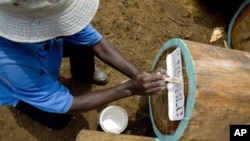A new report says Africa should break with the past in moving from trade in commodities, to trade which enhances its productive capacity. The United Nations Conference on Trade and Development, UNCTAD, has just issued its Economic Development in Africa Report 2010.
The report notes trade between Africa and non-African developing countries is growing, especially with the emerging economic powerhouses China, India and Brazil.
It says Africa should seize the opportunity of trading with large developing countries to diversify production, acquire technology and develop regional markets.
The study warns so far, trade and investment flows with the south are reinforcing a long-standing trend, which is not very helpful to Africa. It says African countries mainly export farm produce, minerals, ores and crude oil and import mostly manufactured goods.
The secretary-general for the U.N. Conference on Trade and Development, Supachai Panitchpakdi, says non-African developing countries should help Africa by moving away from concentrating on its minerals and energy industry.
"In order to help Africa, and we would like to see South-South Cooperation being more than a guise towards exploitation of natural resources of Africa. The scope should be broadened to cover more than just extraction. We think that from the side of non-African partners countries, they should be trying to enlarge the scope of their coverage of countries in Africa to include other countries that are less well endowed with natural resources as well, said Supachai Panitchpakdi.
The report finds Africa's total merchandise trade with non-African developing countries increased from $34 billion in 1995 to $283 billion in 2008.
It says China is Africa's most important trading partner. The report says Africa's total merchandise trade with China increased from $25 billion in 2004 to $93 billion in 2008.
During the same period, it notes Africa's trade with India increased from $9 billion to $31 billion, and it increased from $8 billion to $23 billion with Brazil.
The report finds China is becoming the most significant bilateral source of support to Africa in the infrastructure and production sectors. It says financial commitments in sub-Saharan Africa soared to $4.5 billion in 2007.
Senior UNCTAD economist Charles Gore says South-South trade and investment relations are mainly oriented towards intensifying Africa's dependence on commodities.
"There is a great potential, an opportunity for these relations to promote transformational growth in Africa. Growth based on structural change… Africa needs certain ingredients of things like infrastructure, skills technology to move beyond commodity dependence and establish local manufacturing industries," he said.
The U.N. conference emphasizes the need to ensure gains are better distributed across countries. It notes in 2008, the five largest African exporters to developing countries accounted for 68 percent of the region's total exports. And, the report says the top five African countries accounted for 57 percent of the region's imports from other developing countries.
The U.N. economists note continuing growth of large developing countries is occurring at the same time advanced economies are facing weaker growth. As a consequence, they say Africa's relationships to other developing regions can be expected to grow in importance.
African Economies Should Emphasize Production




